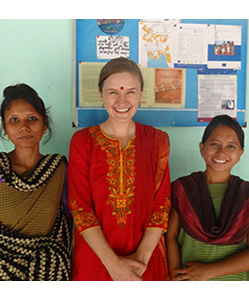A Disucssion with Tista Khongstia and Rebecca Dikhar, Teachers at Lama Punjee Education Center, Caritas Aloghar Project, Sylhet Region, Bangladesh
With: Tista Khongstia Berkley Center Profile Rebecca Dikhar Berkley Center Profile
June 19, 2014
Background:
As
part of the Education and Social Justice Fellowship, in June 2014 student
Kendra Layton interviewed Tista Khongstia and Rebecca Dikhar, teachers in an educational center in Sylhet Region, Bangladesh, that is part of Caritas Bangladesh's Aloghar (Lighthouse) Project. Beginning in November 2011, Aloghar is part of the Supporting the Hardest to Reach through Basic Education initiative and includes 1,005 education centers in six regions of Bangladesh. Aloghar aims to increase the literacy, empowerment, and integration of the hardest-to-reach Bangladeshi children. In this interview,
Tista Khongstia and Rebecca Dikhar reflect on the challenges they face as
teachers and the importance of students learning in their native tongue, Khasi.
Could
you tell me more about this Aloghar education center, Lama Punjee?
We have 74 students, and most of them are from the indigenous Khasi community. We serve early childhood to class five. Tista has been teaching here five years, and Rebecca has been here two years.
What are some of the challenges you face as teachers?
Sometimes it can be hard to teach because parents are not aware of the importance of education. Students drop out to become involved in their family’s work like betel leaf production. When they do drop out, we make family visits to spread awareness about the importance of education.
What are your hopes for your students after completing class five?
We hope they will stay in a hostel or a mission school to continue their education, either that or mainstream into a government school.
Could you speak more about the importance of the students learning about the Khasi language and culture?
The most important thing is to keep alive the Khasi culture. If we do not practice it, it will disappear. That is why it is very important to study the Khasi language.
What does Aloghar symbolize to you?
Before Aloghar, we taught by traditional methods. Aloghar started teaching through playing. Doing so motivates children through innovative projects. The center is very engaging for them, which makes them want to come to school. We also reach the hard core poor students.
What kinds of training do you receive?
We attend many teacher trainings at the Caritas Regional office in Sylhet to build our capacity.
What is your relationship like with the area coordinator and education supervisors of Aloghar?
Under this region there are about 100 educational centers. When the area coordinator and education supervisors come, they stay the whole day. If they find anything lacking in our teaching, they try to motivate and redirect us. They provide ongoing supervision and support.
We have 74 students, and most of them are from the indigenous Khasi community. We serve early childhood to class five. Tista has been teaching here five years, and Rebecca has been here two years.
What are some of the challenges you face as teachers?
Sometimes it can be hard to teach because parents are not aware of the importance of education. Students drop out to become involved in their family’s work like betel leaf production. When they do drop out, we make family visits to spread awareness about the importance of education.
What are your hopes for your students after completing class five?
We hope they will stay in a hostel or a mission school to continue their education, either that or mainstream into a government school.
Could you speak more about the importance of the students learning about the Khasi language and culture?
The most important thing is to keep alive the Khasi culture. If we do not practice it, it will disappear. That is why it is very important to study the Khasi language.
What does Aloghar symbolize to you?
Before Aloghar, we taught by traditional methods. Aloghar started teaching through playing. Doing so motivates children through innovative projects. The center is very engaging for them, which makes them want to come to school. We also reach the hard core poor students.
What kinds of training do you receive?
We attend many teacher trainings at the Caritas Regional office in Sylhet to build our capacity.
What is your relationship like with the area coordinator and education supervisors of Aloghar?
Under this region there are about 100 educational centers. When the area coordinator and education supervisors come, they stay the whole day. If they find anything lacking in our teaching, they try to motivate and redirect us. They provide ongoing supervision and support.

Opens in a new window
